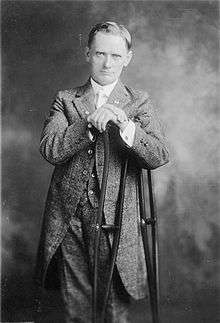William David Upshaw
| William David Upshaw | |
|---|---|
 William David Upshaw, c. 1919 | |
| Member of the U.S. House of Representatives from Georgia's 5th district | |
|
In office March 4, 1919 – March 3, 1927 | |
| Preceded by | William S. Howard |
| Succeeded by | Leslie J. Steele |
| Personal details | |
| Born |
October 15, 1866 Newnan, Georgia |
| Died |
November 21, 1952 (aged 86) Glendale, California |
| Political party |
Democratic Party Prohibition Party |
| Alma mater | Mercer University |
William David Upshaw (October 15, 1866 – November 21, 1952) served eight years in Congress (1919–1927), where he was such a strong proponent of the temperance movement that he became known as the "driest of the drys.".
He was born on October 15, 1866 and served as vice-president of the Georgia Anti-Saloon League in 1906 and played a major role in passage of statewide prohibition in that state in 1907, making it the first dry state in the South.
The defense of prohibition was a major factor in the establishment of the second Ku Klux Klan ("Klan of the 1920s") in 1915. However, Upshaw was not sympathetic with the Klan, and, on one occasion, ran against a Klan-supported candidate for public office.
In a January 1951, after having been crippled for fifty-nine years as the result of an accident, Upshaw claimed to have been miraculously healed and had regained the ability to walk in a William Branham revival meeting.[1] Upshaw sent a letter describing his healing claim to each member of Congress.[2][1] Among the widespread media reports was a story carried in the Los Angeles Times that described it as "perhaps the most effective healing testimony this generation has ever seen."[2] Known as the "Billy Sunday of Congress," Upshaw was supported politically by the most powerful names in Southern Protestantism, including evangelist Bob Jones, Sr., the founder of what eventually became Bob Jones University. Upshaw served as a member of the Board of Trustees from the founding of Bob Jones College in Lynn Haven, Florida in 1927 until he was dropped from the Board in 1932 because of failure to attend the annual Board meetings or file his voting proxies. (See William David Upshaw Correspondence file, Bob Jones University Archives, Mack Library.)
In 1932, he was the Prohibition Party candidate for the President of the United States with Frank S. Regan of Illinois as his running mate. The ticket came in fifth, losing to Franklin D. Roosevelt (who favored repeal of prohibition), incumbent Republican President Herbert Hoover, Socialist candidate Norman Thomas, and Communist candidate William Z. Foster.
For the remainder of his life he was a strong supporter of the prohibition of alcoholic beverages. He died on November 21, 1952.
References
- 1 2 Harrell 1978, p. 35.
- 1 2 Weaver 2000, p. 57.
- Harrell, David (1978). All Things Are Possible: The Healing and Charismatic Revivals in Modern America. Indiana University Press. ISBN 0-525-24136-1.
- Weaver, C. Douglas (2000). The Healer-Prophet: William Marrion Branham (A study of the Prophetic in American Pentecostalism). Mercer University Press. ISBN 978-0-865-54710-0.
- Upshaw, William D (1893). Earnest Willie, Or Echoes From A Recluse. Franklin Printing And Publishing Co.
External links
- United States Congress. "William David Upshaw (id: U000026)". Biographical Directory of the United States Congress.

- William D. Upshaw
- Described (in French) as "the driest man in the United States;" along with photograph. Le Petit Journal, Montreal, 10 June 1934
| U.S. House of Representatives | ||
|---|---|---|
| Preceded by William S. Howard |
Member of the U.S. House of Representatives from Georgia's 5th congressional district March 4, 1919 – March 3, 1927 |
Succeeded by Leslie J. Steele |